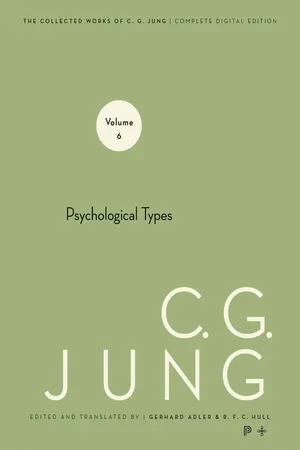
Collected Works of C. G. Jung, Volume 6
Psychological Types
C. G. Jung, Gerhard Adler, R. F.C. Hull
- 640 Seiten
- English
- ePUB (handyfreundlich)
- Über iOS und Android verfügbar
Collected Works of C. G. Jung, Volume 6
Psychological Types
C. G. Jung, Gerhard Adler, R. F.C. Hull
Über dieses Buch
One of the most important of Jung's longer works, and probably the most famous of his books, Psychological Types appeared in German in 1921 after a "fallow period" of eight years during which Jung had published little. He called it "the fruit of nearly twenty years' work in the domain of practical psychology, " and in his autobiography he wrote: "This work sprang originally from my need to define the ways in which my outlook differed from Freud's and Adler's. In attempting to answer this question, I came across the problem of types; for it is one's psychological type which from the outset determines and limits a person's judgment. My book, therefore, was an effort to deal with the relationship of the individual to the world, to people and things. It discussed the various aspects of consciousness, the various attitudes the conscious mind might take toward the world, and thus constitutes a psychology of consciousness regarded from what might be called a clinical angle."
In expounding his system of personality types Jung relied not so much on formal case data as on the countless impressions and experiences derived from the treatment of nervous illnesses, from intercourse with people of all social levels, "friend and foe alike, " and from an analysis of his own psychological nature. The book is rich in material drawn from literature, aesthetics, religion, and philosophy. The extended chapters that give general descriptions of the types and definitions of Jung's principal psychological concepts are key documents in analytical psychology.
Häufig gestellte Fragen
Information
INDEX
Inhaltsverzeichnis
- Cover
- Halftitle
- Title
- Copyright
- Editorial Note
- Contents
- Foreword to the First Swiss Edition
- Foreword to the Argentine Edition
- Introduction
- I. The Problem of Types in the History of Classical and Medieval Thought
- II. Schiller’s Ideas on the Type Problem
- III. The Apollinian and the Dionysian
- IV. The Type Problem in Human Character
- V. The Type Problem in Poetry
- VI. The Type Problem in Psychopathology
- VII. The Type Problem in Aesthetics
- VIII. The Type Problem in Modern Philosophy
- IX. The Type Problem in Biography
- X. General Description of the Types
- XI. Definitions
- Epilogue
- Appendix: Four Papers on Psychological Typology
- Table: Correlation of Paragraph Numbers
- Bibliography
- Index
- Footnotes